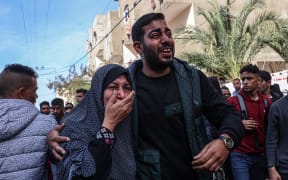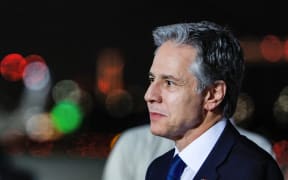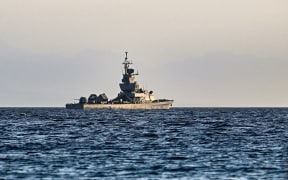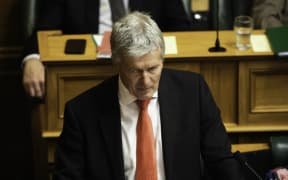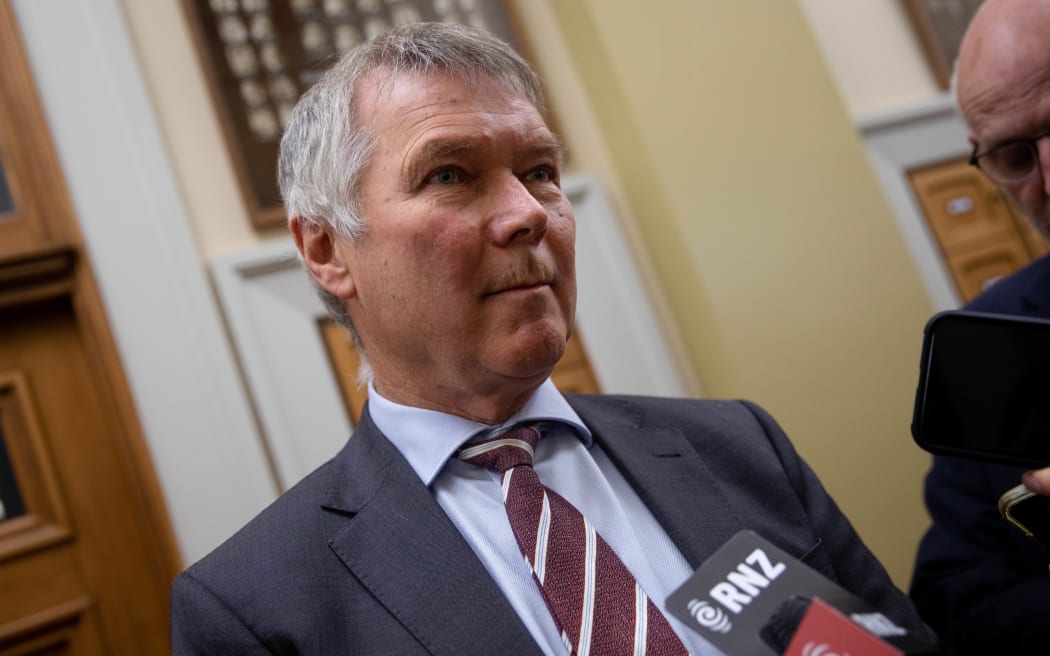
Labour's Foreign Affairs spokesperson David Parker. Photo: RNZ / Angus Dreaver
New Zealand should support South Africa's legal action at the International Court of Justice, including allegations of genocide in Gaza by Israel, Labour says.
In a statement on Wednesday, Labour's Foreign Affairs spokesperson David Parker urged the government to back the case. Parker said Israel denied the claims of genocide but the ICJ was the appropriate body to investigate whether international laws and the Genocide Convention had been breached.
He noted New Zealand had joined other countries in voting at the UN for an immediate ceasefire, and should - as it had in the recent genocide case between Russia and Ukraine, also at the ICJ - make submissions to the ICJ.
He told RNZ Labour was calling for New Zealand to do its bit and participate in the hearing.
"For genocide to be made out doesn't necessarily rely upon a country trying to wipe out or exterminate a race or population. Trying to expel them from their home country can also amount to genocide on occasions and there are some of the Israeli ministers who have called for the expulsion of the Palestinian people from the Palestinian territories.
"Now, whether that's the government's position or just errant ministers is something that will be worked through at the hearing, but we think it is appropriate that New Zealand assist the International Court of Justice by intervening and making legal submissions on the case."
The genocide claim could take two years or more to conclude.
In a statement, a spokesperson from the Ministry of Foreign Affairs and Trade said the government was gravely concerned about the impact of the conflict on civilians, and was a long-standing supporter of the international legal system.
However, it was up to the ICJ to make its rulings, the spokesperson said.
"The loss of life is appalling and the government continues to call on regional actors to do all they can to ensure there is no further escalation and support international efforts to bring about the conditions for a permanent ceasefire," the spokesperson said.
"It is up to the ICJ undertake its work impartially and to make complex findings of fact and law. It would be inappropriate for New Zealand to comment on, or pre-judge its decisions, including on very serious allegations such as genocide."
RNZ has sought further comment from government ministers.
Parker said the government should also support South Africa's call for other interim measures, to immediately cease hostilities, which the ICJ is expected to begin considering this week.
An ICJ finding in support of those measures would mean the matter would then be considered by the UN Security Council, which would open the way for sanctions if Israel ignored a security council directive to cease hostilities.
Parker said the government did not need to support a finding of genocide, the question was whether it would support the court in its deliberations, "as they did in the Ukraine-Russia case and actually years ago in the Rwanda genocide case when New Zealand was very active".
"We've got a history in this space, we're respected internationally, and we do need international institutions like International Court of Justice to play the proper part when you have conflicts like this, to make sure that the rules of war are being adhered to, and that people don't go too far.
"There've been tens of thousands of Palestinians killed in this conflict, we accept that the wa by Israel against Gaza was initiated by Hamas and that they were entitled to respond but we also think it's proper - given that the UN in a resolution, backed by New Zealand, called for a ceasefire and that's essentially been ignored by the Israelis - that we back the International Court of Justice in their deliberations."
"We think that it's the responsible thing to do ... and that it is appropriate that there's international scrutiny as to whether the actions of Israel have gone too far."
Parker said the interim measures were the world's best and most immediate change to stop the killing in Gaza, and if the ICJ finding was in favour of them the matter would go to the UN Security Council.
The New Zealand government late last year backed the calls for an immediate ceasefire at the UN, just days after Parliament agreed to a weaker call for "steps towards" a ceasefire.
That was despite opposition parties including Labour calling for a stronger statement.
Labour's Damien O'Connor went even further than the party's own position during the debate, saying in Parliament the conflict was "nothing more than a genocide".
Green Party co-leader Marama Davidson also said it was "absolute murder and genocide and slaughter" and called for Parliament to recognise the targeting of civilians, schools and hospitals as a war crime - but this was rejected.
Te Pāti Māori's co-leader Debbie Ngarewa-Packer said it was an attempted genocide, backed by what she said was well documented genocidal rhetoric from Israeli ministers and officials.
Foreign Minister Winston Peters at the time said a finding of genocide would be for a judicial body like the International Criminal Court to make, based on evidence.
The ICJ and South Africa's case
The ICJ is the highest legal body at the UN, established to deal with disputes between states - as opposed to the International Criminal Court which handles war crimes cases against individuals - and is composed of 15 judges who are elected by the UN General Assembly for a nine-year term.
South Africa's 84-page filing of its case against Israel claims that acts attributable to Israel amount to committing, and failing to prevent, genocide.
"South Africa unequivocally condemns all violations of international law by all parties, including the direct targeting of Israeli civilians and other nationals and hostage-taking by Hamas and other Palestinian armed groups," the filing said.
"No armed attack on a State's territory no matter how serious - even an attack involving atrocity crimes - can, however, provide any possible justification for, or defence to, breaches of the 1948 Convention on the Prevention and Punishment of the Crime of Genocide whether as a matter of law or morality.
"The acts and omissions by Israel complained of by South Africa are genocidal in character because they are intended to bring about the destruction of a substantial part of the Palestinian national, racial and ethnical group, that being the part of the Palestinian group in the Gaza Strip."
The first public hearing on the provisional measures - which would demand a halt to hostilities - are set to be held on Thursday and Friday local time at the court in Geneva.
The measures would aim to "protect against further, severe and irreparable harm to the rights of the Palestinian people under the Genocide Convention" and "ensure Israel's compliance with its obligations under the Genocide Convention," according to South Africa's application.
Israel, South Africa and New Zealand are all signed up to the 1948 Convention on the Prevention and Punishment of the Crime of Genocide, also known as the Genocide Convention.
